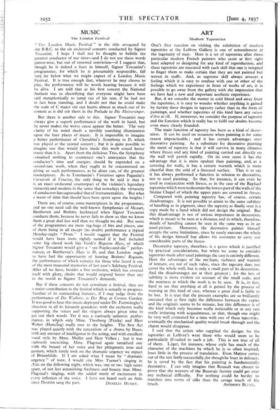MUSIC The London Festival
" THE London Music Festival " is the title arrogated by the B.B.C. to the six orchestral concerts conducted by Signor Toscanini. I hope I shall not be thought to belittle the greatest conductor of our time—and I do not use those words parrot-wise, but out of renewed conviction—if I suggest that, though he is indeed a feast in himself, Signor Toscanini's programmes, for which he is presumably responsible, fall very far below what we might expect of a London Music Festival. It is true enough that, whatever he may choose to play, the performance will be worth hearing because it will be alive. I am told that at his first concert the National Anthem was so electrifying that everyone might have been said metaphorically to jump out of his seat, if he had not in fact been standing, and I doubt not that he could make the scale of C major stir our hearts almost as much out of its context as it did stir them in the Prelude to The Meistersinger.
But there is another side to this. Signor Toscanini may always give a superb performance of the work in hand, but he never makes the worse cause appear the better. The very clarity of his mind sheds a terribly searching illumination upon the bare places of music. It is impossible to imagine a better performance of Cherubini's Symphony in D, which was played at the second concert ; but it is quite possible to imagine one that would have made this work sound better music than it is. Apart from the delicious Trio, the Symphony ontained nothing to counteract one's annoyance that the conductor's time and energies should be expended on a second-rate work, when they ought to be concentrated on giving us such performances, as he alone can, of the greatest masterpieces. As to Tommasini's Variations upon Paganini's Carnevale di Venezia, the only thing to be said is that it is an exact orchestral counterpart of the violinist's legendary virtuosity and modern in the sense that nowadays the virtuosity of conductors has superseded that of instrumentalists. But what a waste of time that should have been spent upon the heights !
There are, of course, some masterpieces in the programmes, and no one need call the well-known Symphonies of Mozart, Beethoven and Brahms hackneyed when Signor Toscanini conducts them, because he never fails to show us that we know them a great deal less well than we thought we did. But some of the programmes are mere rag-bags of bits and pieces, one of them being in all except (no doubt) performance a typical Monday-night " Prom." I would suggest that the Festival would have been more rightly named if it had included some big choral work like Verdi's Requiem Mass, of which Signor Toscanini would give a " see-Naples-and-die " perfor- mance, or Beethoven's Mass in D, and that London ought to have had the opportunity of hearing Brahms' Requiem, the performance of which remains for those who heard it one of the most treasured memories of last year's Salzburg Festival. After all we have, besides a fine orchestra, which has covered itself with glory, choirs that would respond better than any in the world to Signor Toscanini's demands.
But if these concerts do not constitute a festival, they are a major contribution to the festival which is actually in progress. Another of its outstanding features, if I may judge from the performance of Die Walkiire, is Der Ring at Covent Garden. It was good to hear this music deployed under Dr. Furtwangler's direction in all its leisurely grandeur, with the orchestra really supporting the voices and the singers always given time to get out their words. Yet it was a curiously unheroic perfor- mance, in which only Mme. Thorborg (Fricka) and Herr Weber (Htmtemg) really rose to the heights. The first Act was played quietly with the naturalism of a drama by Ibsen, with any amount of intelligence in the acting, and with excellent vocal style by Mme. Muller and Herr Volker ; but it was curiously unexciting. Mme. Flagstad again tantalised one with the beauty of her voice and her phlegmatic tone and gesture, which rarely took on the dramatic urgency we expect of Briinnhilde. if I am asked what I mean by " dramatic urgency " of tone, I would cite Miss Turner's singing in Aida on the following night, which was, one or two high notes apart, of not less astonishing freshness and beauty than Mme. Flagstad's singing, with the added merit of excitement in every inflexion of the voice. I have not heard such an Aida










































 Previous page
Previous page